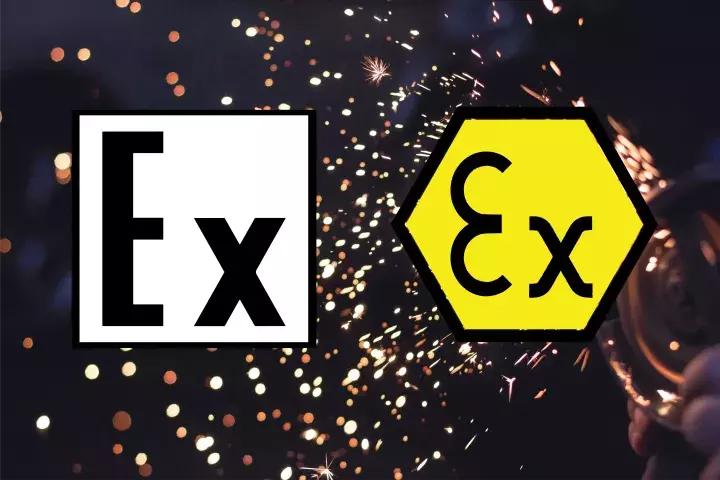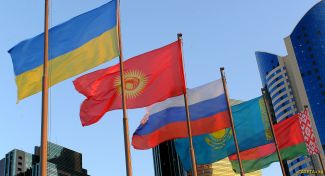
Explosion protection is a field that follows mostly uniform fundamental principles of explosion safety worldwide. Around the world, various countries and regions have implemented their own standards and certification systems for explosion-proof equipment, some of them are applied globally.
In Europe, the ATEX Directive 2014/34/EU applies. ATEX is the European Union directive that regulates the safety of equipment and protective systems intended for use in explosive atmospheres.
IECEx is a global certification system which is not legally mandatory, but it is recognized in the EU. It was officially adopted by Australia, New Zealand, Singapore, India, and Israel.
In the United States, equipment must comply with NEC classification, meet OSHA workplace safety rules, and be certified by recognized labs like UL or FM to be legally used in hazardous locations.
The countries of the Euarisan Economic Union (Kazakhstan, Russia, Belarus, Armenia, and Kyrgyzstan) have elaborated their own regulation, which provides the safety requirements for electrical and non-electrical equipment operated in potentially explosive surroundings for the protection of life, health, property and the environment - TR CU 012/2011 "On the Safety of Equipment for Operation in Explosive Atmospheres"
That is why, in international projects, it is crucial to ensure full compliance with all regulations governing explosion-proof equipment. In this article, we take a closer look at the differences between the ATEX Directive and TR CU 012/2011.Although the two technical regulations have many overlaps and remarkable similarities (some wording is identical), there are also clear differences, such as:
- TR CU 012 recognizes a third level of protection for mining: PO, PB, PП
- There is no equivalent to “Internal Production Control” in TR CU 012
- The Technical Regulation TR CU 012/2011 does not provide for a manufacturer’s declaration (EAC Declaration) as in the ATEX Directive 2014/34/EU (Module A – Internal Production Control)
In the table, we have summarized the key features of ATEX, TR CU 012/2011 and IECEx:
| Feature | ATEX (EU) | TR CU 012/2011 (EAEU) | IECEx |
|---|---|---|---|
| Targeted Jurisdiction | European Union, obligatory | Eurasian Economic Union (Russia, Kazakhstan, Belarus, Armenia, Kyrgyzstan), obligatory | Global (any country that recognizes IECEx), voluntary |
| Legal source | Directive 2014/34/EU | Technical Regulation TR CU 012/2011 | IECEx standards |
| Application area | Electrical and non-electrical equipment | Electrical and non-electrical equipment | Electrical and non-electrical equipment, Service Facility Scheme, Certification of Personnel Competencies |
| Conformity assessment procedure | Manufacturer declaration for Category 3, Notified Bodies (ExNB) for others. | Certificate only via accredited certification body | Certificate only via IECEx Certification Bodies (ExCB) and IECEx Test Labs (ExTL) |
| Name of the certificate | EU - Type Examination Certificate | Certificate of conformity | IECEx Certificates of Conformity |
| Schemes / Modules | Modules A, B, D, F, C1, E, G depending on equipment category | Schemes 1c, 3c and 4c depending on delivery type – series, single, batch | Single standardized process (product testing and factory audit) |
| Marking | CE + Ex  |
EAC Ex  |
No special logo. The marking is technical, following the Ex code format from the IEC 60079 standards: "IECEx XXX xx.xxxx" |
| Zones / Categories | Zone: Gas: 0, 1, 2; Dust: 20, 21, 22; Group: I, II; Category: 1, 2, 3 | Zone: Gas: 0, 1, 2; Dust: 20, 21, 22; Group: I, II, III; Group I: PO, PB, ПП; Group II: 0, 1, 2 |
Zone: Gas: 0, 1, 2; Dust: 20, 21, 22; explosion protection a, b, c |
| Quality system audit | QAN/QAR required for category 1 and 2 | Quality system audit required under scheme 1c | Quality system audit required |
| Language of documentation | Local EU languages | Russian and local EAEU language | English |
| Applicant | Manufacturer or EU authorized representative | Only legal entity within EAEU, manufacturer’s representative | Manufacturer |
| Testing body | Notified Bodies | Accredited EAC certification bodies | Accredited IECEx certification bodies |
What is an EAC EX-Certificate?
The EAC EX-Certificate of the Eurasian Economic Union (EAEU) is an official document that proves that the conformity of the products is fulfilled in compliance with the specified requirements in the harmonized technical regulation TR CU 012/2011. It proves the capability of equipment or systems to withstand the effects of an explosion—including impact and heat—without sustaining damage, while continuing to operate normally.
Does the device need to already have an ATEX or IECEx certificate to obtain an EAC Ex certificate?
No, an ATEX certificate or other approvals for explosion-proof equipment are not a prerequisite for obtaining a certificate under the TR CU 012/2011 regulation. The certification body independently assesses the safety of the device regardless of existing approvals. However, having an ATEX certificate can simplify the EAC certification process.
It is also important to understand that ATEX or IECEx certificates are not recognized as proof of explosion safety within the Eurasian Economic Union (EAEU). To sell and operate explosion-proof equipment in the EAEU, an EAC certificate according to TR CU 012/2011 must be issued.
Are the test reports or audits from ATEX certification recognized?
No, EAC certification is an independent process. The ATEX certificate and test reports can be helpful references, but they cannot replace the audit or product testing carried out by an accredited certification body. The technical regulation TR CU 012/2011 requires that product samples be tested by a laboratory approved within the EAEU. The same applies to on-site inspections and the audit of the quality management system for serial production (Scheme 1c).
Can the EAC Ex certificate be replaced by an EAC EX declaration?
No. The technical regulation TR CU 012/2011 does not provide for a manufacturer’s declaration (EAC Declaration). Unlike the European system under the ATEX Directive 2014/34/EU, where the manufacturer may declare conformity independently for certain categories of equipment (e.g., Module A – Internal Production Control), the EAEU regulation requires certification exclusively by an accredited certification body within the EAEU.
This means that the manufacturer or its authorized representative in the Eurasian Economic Union (EAEU) must submit an application to a certification body accredited in one of the member states. The certification body will then review the technical documentation, product samples, and quality management system.
An independent “manufacturer’s declaration” or self-certification—as allowed under ATEX for certain product categories—is therefore not permitted within the EAEU system.
Can explosion-proof equipment with an EAC Ex certificate also be installed in safe areas?
Yes. It is only necessary to check whether other regulations might also apply. For example, an existing Ex certificate cannot replace the requirements of TR CU 004 on the safety of low-voltage equipment.
It is also important to note that as soon as the equipment carries an Ex marking, it must have the Ex certificate, even if it is used in safe areas.
How can I apply for the EAC Ex-Certificate?
According to current legislation, only a company registered within the territory of the Eurasian Economic Union can apply for the EAC certification. In this case, the foreign producer needs an authorized representative in an EAEU Member State. For European, American, or Asian producers, this is a mandatory prerequisite for certification and market access to the EAEU.
Certification procedure consists of different steps. The first step, as mentioned above, is to find a company in the EAEU who will be the authorized representative of the foreign manufacturer and represent him before the certification bodies and supervisional authorities. The Authorized prepares a certification application based on the provided documents/information and files it by the certification body.
The next step is to prepare technical documents such as Operating Manual in Russian, ATEX certificate or similar, technical drawings, wiring diagrams, ignition hazard assessment for electrical equipment. The description of the product must contain all EX components, including type, manufacturer, and EX marking. It is very beneficial to have a TR ZU 012 certificate for all EX components because it reduces the costs for the certification. If an EAC certificate for an EX component is missing: an ATEX certificate or similar is required. Based on this information the certification body prepares a draft of the certificate.
The next very important step is conducting the manufacturing audit. The technical regulation TR CU 012/2011 requires a mandatory inspection of the production site(s) (if the product is manufactured at multiple sites) and the manufacturer’s quality management system. The audit is carried out on-site by an accredited certification body. Its primary purpose is to verify whether the production processes meet the specified requirements. The execution of the production audit is governed by the national standard of the Russian Federation GOST R 54293-2010 “Production Audit for Conformity Assessment Procedures.” Remote audit is not possible.
During the audit the notified body chooses samples for testing. Tests are usually performed either in the accredited laboratory in the EAEU or, less commonly, by the manufacturer.
After analyzing the results of the tests, audit and technical documents, the certification body issues the EAC certificate.
What is the Period of validity of EAC conformity assessment certificates?
The validity period of the EAC certificate for Explosion-proof equipment differs depending on the selected scheme, which depends on the type of production (serial production, individual delivery, etc.). The maximum validity under Scheme 1c is 5 years.Who is responsible for compliance with regulations in the EAWU?
Similar to ATEX certification, either the manufacturer (if it is a domestic manufacturer) or the authorized representative is responsible for ensuring that the regulations are followed. A manufacturer not established in one of the Eurasian Economic Union member states is not entitled to apply for a conformity assessment of its products for compliance with the relevant technical regulations.
To conduct a conformity assessment, a foreign manufacturer must appoint an authorized representative in one of the EAWU member states. This representative acts on behalf of the foreign manufacturer in cooperation with EAWU certification bodies regarding product safety, quality, and compliance with technical regulations.
According to applicable law and the technical regulations of the Union, only an entrepreneur residing within the territory of the Eurasian Economic Union may be appointed as an authorized representative.
Schmidt & Schmidt supports manufacturers from Europe, America, and Asia in appointing an authorized representative in the EAWU. Thanks to our legally compliant solution concept via Kazakhstan – an EAWU member state – we can ensure the issuance of EAC certificates . With our local offices, we ensure that the entire certification process complies not only with the technical regulations of the Eurasian Economic Union but also with European and American sanction rules, providing our clients with a reliable and legal access to the EAWU market.
Can the EAC EX Certificate be extended?
The TR CU regulations do not provide for an extension of the certificate. After its expiration (usually after 5 years), the certificate is archived in the registry. If the product continues to be sold, a new certification must be applied for. The entire certification process must be repeated.
What happens if the manufacturer makes a change to the equipment or wants to add other manufacturing locations?
This is possible within the IECEx and ATEX certification. The manufacturer must report about changes to the issuing Certification Body. The new sites will be audited, changes reviewed. Once audits are completed, the certificate is updated (reissued) to include the additional locations and changes. No changes are possible with the EAC certification. In case of significant technical changes of the product or adding of additional manufacturing facilities, a certification procedure must be repeated.Can the EAC EX Certificate be revoked?
Yes. The EAC EX Certificate can be suspended or revoked in accordance with the Technical Regulation TR CU 012/2011 “On the Safety of Equipment for Use in Explosive Atmospheres” and the accreditation rules of the Eurasian Economic Union (EAWU).
The suspension or revocation is carried out by the accredited certification body and recorded in the unified EAWU registry.
The certificate status will be updated as follows:
- Suspended
- Cancelled
After revocation, the “EAC EX” marking may no longer be used on the product or in accompanying documentation.
Reasons for Revocation or Suspension
- Non-conformity of products: The product does not match the tested sample or has been modified without notifying the certification body.
- Missing or incomplete technical documentation: e.g., missing safety justification (Обоснование безопасности), operating manual (РЭ), or test reports.
- Errors or manipulation: Irregularities in test reports, documents, or EAC markings.
- Failure to pass inspection control: For serial production, annual inspection is required. Failure to conduct it leads to temporary suspension and eventual revocation of the certificate.
- Termination of the certification body’s activities: Loss or revocation of accreditation.
- Voluntary withdrawal: The applicant (manufacturer or authorized representative) can request revocation.
Restoration of the Certificate
A suspended certificate can be reactivated if the manufacturer remedies the identified deficiencies and provides evidence or undergoes a new audit. A cancelled certificate cannot be reactivated.
How should the marking on explosion-proof equipment look?

In addition to the EAC mark, the Ex mark must also be applied. The equipment must be labeled with a specific EX symbol.
The EAC EX marking consists of a combination of two stylized letters “E” and “x.” Ex stands for explosion protection. The height of the “x” is 5/9 of the height of the “E.” The mark must be placed on a white or contrasting background.
The dimensions of the EX mark must ensure readability with the naked eye on the background, with a minimum height of 10 mm. The height-to-width ratio is 11/8.
The Ex mark should be applied to every device, Ex component, or corresponding documentation.
How long does the EAC Ex certification process take?
Applying for an EAC Ex certificate is a time-consuming and cost-intensive process. On average, the processing time usually takes several weeks but may vary depending on the complexity of the project. The duration of the certification process depends on the following factors:- Type of delivery: Single shipment (contract-based) vs. serial production - for serial production a manufacturing audit must be conducted.
- Product characteristics: Complexity of the equipment, number of different types and ex-markings as well as the number of ex-proof components influence the scope of testing
- Audit: audit is necessary for scheme 1c
- Completeness of documentation: if some documents are missing, they must be developed.
- Availability of samples: Selection and shipment of product samples for laboratory testing
What are the costs for the EAC EX-Certification?
Exact costs of the EAC certification are always determined individually.The costs for the application for Explosion-proof equipment depend on several different factors, such as:- Type and complexity of the products: complex Design, number of explosion-protected components, number of Ex-markings enhances the certification costs
- Scope of testing: depends on the type of explosion protection and construction of the equipment
- Completeness of documentation: if some documents are missing, they must be developed
- Type of delivery: serial production stipulates conduction of the manufacturing audit and annual inspection control
- Samples for testing: amount of the required samples depends on the amount of types/models and number of different ex markings. The samples are destroyed during the tests and cannot be returned.
Are there any additional costs?
Yes, after the issuance of an EAC Ex-Certificate, a regular inspection control is required. The monitoring is carried out annually to ensure that production continues to comply with the technical regulations of the Eurasian Economic Union (EAEU) and that the products are correctly marked with the EAC mark or conformity marking. Without a successfully completed inspection control, the EAC certificate loses its validity.
Inspection control refers to a systematic, recurring conformity assessment carried out by the certification body that originally issued the EAC certificate. This includes, among other things, the review of production documentation, quality management processes, and sampling of products. This regular inspection forms the basis for the maintenance of the validity of the EAC certificate.
What do I also need to take into consideration?
A very important issue is compliance with EU and US sanctions in the context of EAC Certification. In addition to the technical regulations of the Eurasian Economic Union (EAEU), European and international companies must also comply with the applicable sanctions of the European Union and the United States when undergoing EAC certification. These regulations particularly concern the export of certain goods, trade with listed individuals and entities, and the provision of technical services. Non-compliance may not only jeopardize business relationships but also entail civil and criminal liability.
The situation is especially critical for exports to Russia and Belarus. Due to the geopolitical situation, numerous embargoes and restrictive measures have been imposed since 2014, which can directly affect the conformity assessment process. For example, it is possible that conformity assessment bodies or business partners in the affected countries are listed on sanctions lists, making cooperation legally impermissible. Therefore, companies must carefully review not only the technical regulations but also the current EU and US sanctions lists.
Another risk arises if a shipment is blocked due to sanctions violations. Even a formally correct conformity assessment does not provide legal certainty in such cases. Therefore, close coordination between compliance departments, export control officers, and certification partners is essential to avoid legal conflicts and to secure the supply chains.
Companies that aim to successfully export their objects of conformity assessment (products) to Kazakhstan, Russia, or other EAEU Member States should not focus solely on compliance with technical regulations but also ensure comprehensive sanctions compliance. This includes reviewing the end-use of products and selecting appropriate authorized representatives and local partners.
Schmidt & Schmidt provides a legally compliant solution via Kazakhstan. As an EAEU Member State, Kazakhstan is authorized to issue EAC certificates and EAC declarations. Through our local offices, we ensure that all conformity assessment processes are carried out in compliance with European and US sanctions regulations while enabling our clients to access the EAEU market.
How Can We Help?
In this rapidly evolving regulatory environment, Schmidt & Schmidt offers comprehensive support for exporters to EAEU countries. Our range of services includes EAC certification, adaptation to specific product categories, and customized solutions to meet the technical and legal requirements of these markets. We are committed to making market entry and expansion in these regions easier for companies by providing up-to-date information and guidelines.
Technical expertise, attention to detail, and accuracy in document preparation are essential for the smooth distribution and use of products, machinery, or equipment within the EAEU. Technical documentation must also be written in Russian or the official language of the member country in which the product is sold or used. To avoid any issues, we are happy to assist you in preparing new technical documentation or reviewing existing documents for completeness and linguistic and terminological accuracy in Russian.
Thanks to their many years of experience, our experts can also offer you specific industry knowledge in the fields of plant engineering, mechanical engineering, metalworking, metrology, electrical engineering, automation, medical technology, food processing, and the furniture industry.
What is an EAC Certification?
In our video, we explain what an EAC Certification is and how and where to certify or declare your products for the introduction on the EAEU market.
The EAC Certification and the EAC Declaration are complex procedures that attest your products the conformity with the technical regulations of the EAEU and require a lot of know-how. Schmidt & Schmidt will support you with the certification of your products for the EAEU market.





